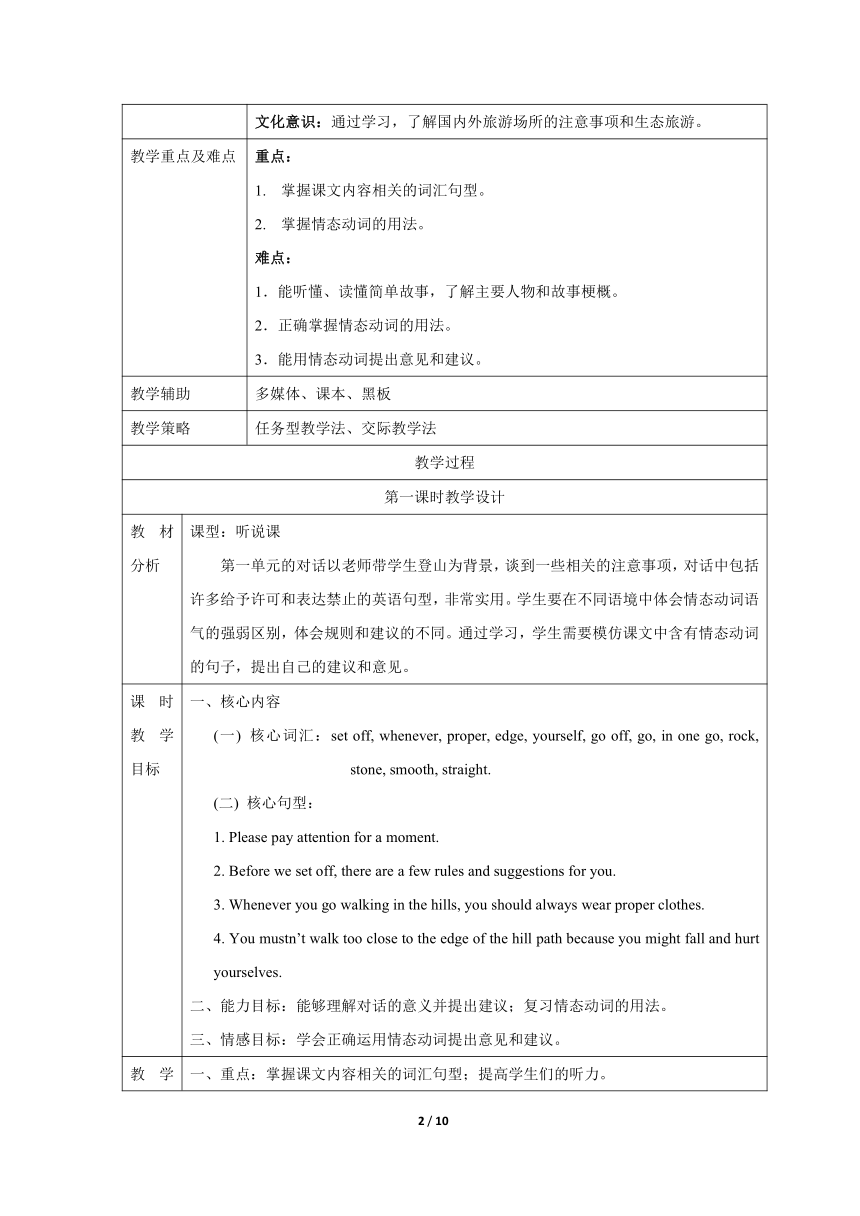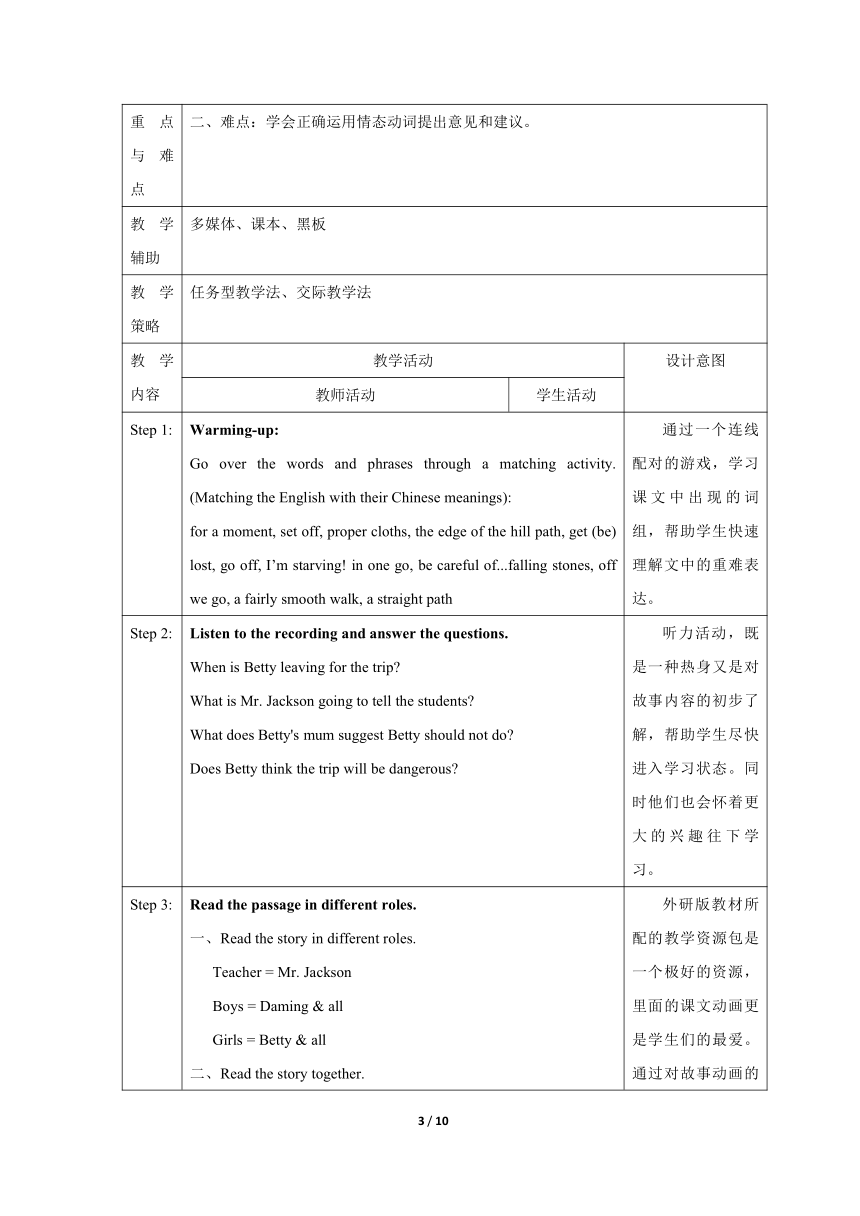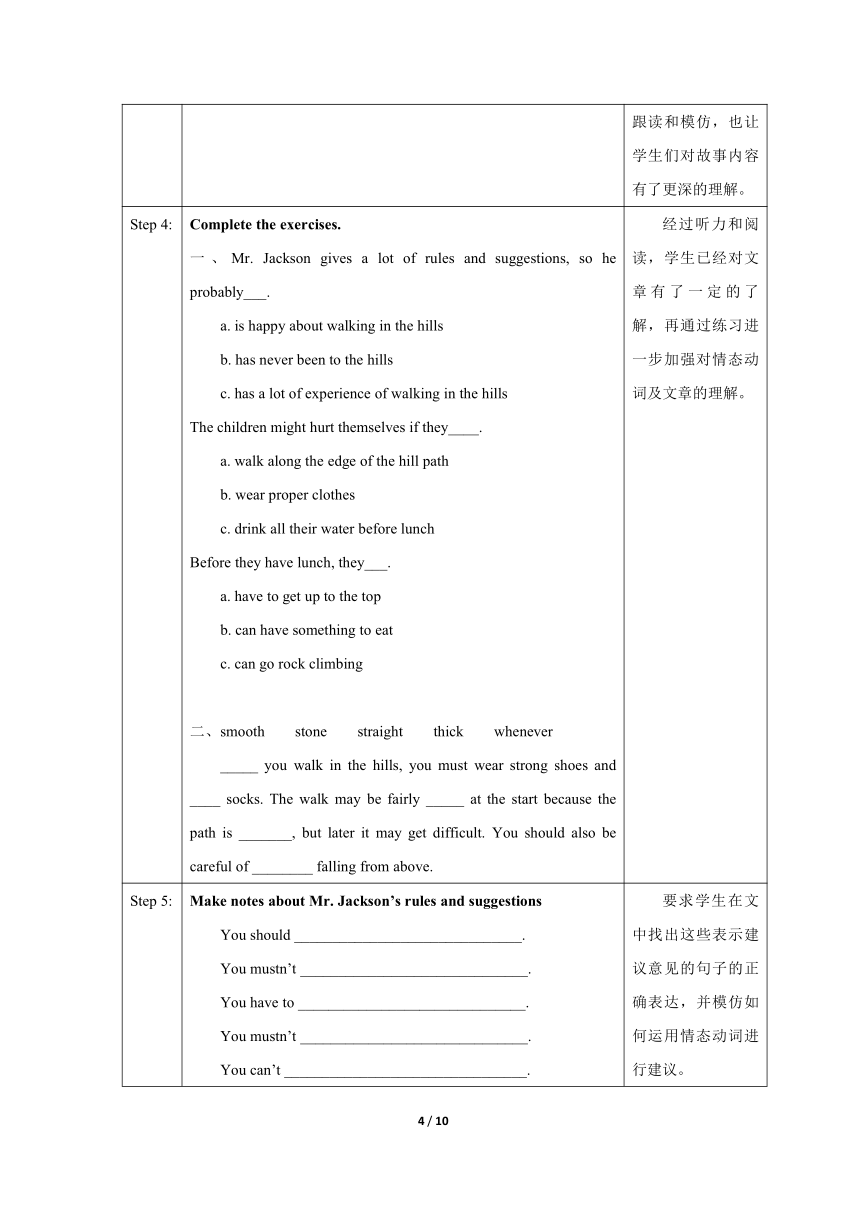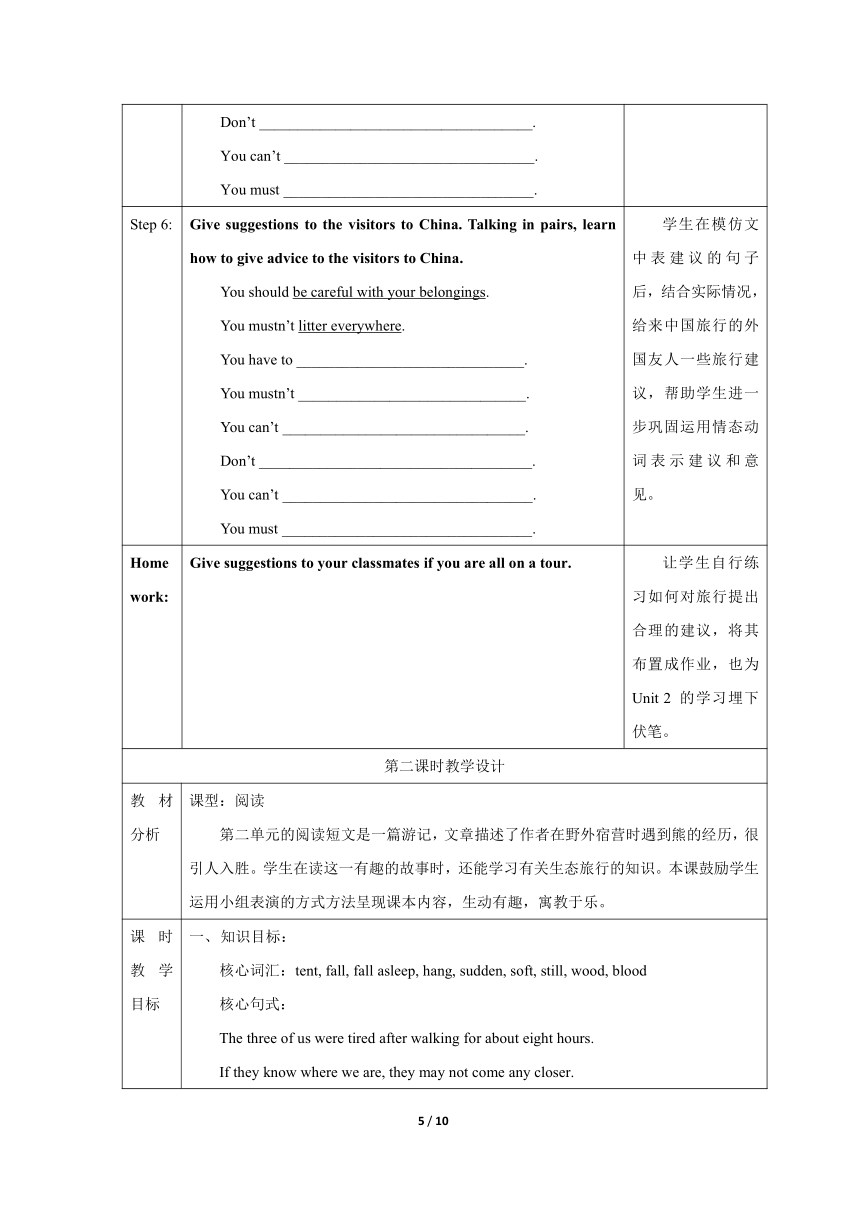外研版英语九年级下Module 4 Rules and suggestions全模块表格式教学设计(3课时)
文档属性
| 名称 | 外研版英语九年级下Module 4 Rules and suggestions全模块表格式教学设计(3课时) |  | |
| 格式 | doc | ||
| 文件大小 | 85.5KB | ||
| 资源类型 | 教案 | ||
| 版本资源 | 外研版 | ||
| 科目 | 英语 | ||
| 更新时间 | 2022-04-18 21:27:22 | ||
图片预览





文档简介
Module 4 Rules and suggestions 模块表格式教学设计
教材及年级名称 《英语》(新标准)九年级下册 模块名称 Module 4 Rules and suggestions
教材分析 本模块的话题是“规则与建议”,内容包括一些旅游场所的规定和安全方面的注意事项,具有一定的教育意义。本模块的语法重点是复习情态动词的用法,需要学生仔细体会说话人的语气和态度,在不同的语境中体会情态动词语气的强弱区别。结合本模块的任务“为来中国的游客提建议”,设计口语练习和作文练习,帮助学生学会运用情态动词提出建议和意见,通过口笔练习巩固情态动词的用法。
模块教学目标 语言知识目标:词汇:set off, whenever, proper, edge, yourself, go off, go, in one go, rock, stone, smooth, straight语法:情态动词。语音:能够识别并正确朗读句子中词语的连接。语言技能目标:听:能听懂发出指令或提出建议的对话。说:能够正确地发出指令或提出建议。读:能读懂描述旅游经历的文章。写:能给旅游者发出一些建议。运用:能够口头和笔头表达旅游建议。情感目标:学会用恰当的方式发出指令或提出建议。学习策略:自学策略:搜集一些用英文描述的旅游场所注意事项。合作学习策略:同学之间交流、探讨问题,学会用英文表达自己的观点。文化意识:通过学习,了解国内外旅游场所的注意事项和生态旅游。
教学重点及难点 重点:掌握课文内容相关的词汇句型。掌握情态动词的用法。难点:1.能听懂、读懂简单故事,了解主要人物和故事梗概。2.正确掌握情态动词的用法。3.能用情态动词提出意见和建议。
教学辅助 多媒体、课本、黑板
教学策略 任务型教学法、交际教学法
教学过程
第一课时教学设计
教材分析 课型:听说课第一单元的对话以老师带学生登山为背景,谈到一些相关的注意事项,对话中包括许多给予许可和表达禁止的英语句型,非常实用。学生要在不同语境中体会情态动词语气的强弱区别,体会规则和建议的不同。通过学习,学生需要模仿课文中含有情态动词的句子,提出自己的建议和意见。
课时教学目标 一、核心内容(一) 核心词汇:set off, whenever, proper, edge, yourself, go off, go, in one go, rock, stone, smooth, straight.(二) 核心句型:1. Please pay attention for a moment.2. Before we set off, there are a few rules and suggestions for you.3. Whenever you go walking in the hills, you should always wear proper clothes.4. You mustn’t walk too close to the edge of the hill path because you might fall and hurt yourselves.二、能力目标:能够理解对话的意义并提出建议;复习情态动词的用法。三、情感目标:学会正确运用情态动词提出意见和建议。
教学重点与难点 一、重点:掌握课文内容相关的词汇句型;提高学生们的听力。二、难点:学会正确运用情态动词提出意见和建议。
教学辅助 多媒体、课本、黑板
教学策略 任务型教学法、交际教学法
教学内容 教学活动 设计意图
教师活动 学生活动
Step 1: Warming-up:Go over the words and phrases through a matching activity. (Matching the English with their Chinese meanings):for a moment, set off, proper cloths, the edge of the hill path, get (be) lost, go off, I’m starving! in one go, be careful of...falling stones, off we go, a fairly smooth walk, a straight path 通过一个连线配对的游戏,学习课文中出现的词组,帮助学生快速理解文中的重难表达。
Step 2: Listen to the recording and answer the questions.When is Betty leaving for the trip What is Mr. Jackson going to tell the students What does Betty's mum suggest Betty should not do Does Betty think the trip will be dangerous 听力活动,既是一种热身又是对故事内容的初步了解,帮助学生尽快进入学习状态。同时他们也会怀着更大的兴趣往下学习。
Step 3: Read the passage in different roles.一、Read the story in different roles.Teacher = Mr. Jackson Boys = Daming & allGirls = Betty & all二、Read the story together. 外研版教材所配的教学资源包是一个极好的资源,里面的课文动画更是学生们的最爱。通过对故事动画的跟读和模仿,也让学生们对故事内容有了更深的理解。
Step 4: Complete the exercises.一、Mr. Jackson gives a lot of rules and suggestions, so he probably___.a. is happy about walking in the hillsb. has never been to the hillsc. has a lot of experience of walking in the hillsThe children might hurt themselves if they____.a. walk along the edge of the hill pathb. wear proper clothesc. drink all their water before lunchBefore they have lunch, they___.a. have to get up to the topb. can have something to eatc. can go rock climbing二、smooth stone straight thick whenever_____ you walk in the hills, you must wear strong shoes and ____ socks. The walk may be fairly _____ at the start because the path is _______, but later it may get difficult. You should also be careful of ________ falling from above. 经过听力和阅读,学生已经对文章有了一定的了解,再通过练习进一步加强对情态动词及文章的理解。
Step 5: Make notes about Mr. Jackson’s rules and suggestionsYou should ______________________________.You mustn’t ______________________________.You have to ______________________________.You mustn’t ______________________________.You can’t ________________________________.Don’t ____________________________________.You can’t _________________________________.You must _________________________________. 要求学生在文中找出这些表示建议意见的句子的正确表达,并模仿如何运用情态动词进行建议。
Step 6: Give suggestions to the visitors to China. Talking in pairs, learn how to give advice to the visitors to China.You should be careful with your belongings.You mustn’t litter everywhere.You have to ______________________________.You mustn’t ______________________________.You can’t ________________________________.Don’t ____________________________________.You can’t _________________________________.You must _________________________________. 学生在模仿文中表建议的句子后,结合实际情况,给来中国旅行的外国友人一些旅行建议,帮助学生进一步巩固运用情态动词表示建议和意见。
Homework: Give suggestions to your classmates if you are all on a tour. 让学生自行练习如何对旅行提出合理的建议,将其布置成作业,也为 Unit 2 的学习埋下伏笔。
第二课时教学设计
教材分析 课型:阅读第二单元的阅读短文是一篇游记,文章描述了作者在野外宿营时遇到熊的经历,很引人入胜。学生在读这一有趣的故事时,还能学习有关生态旅行的知识。本课鼓励学生运用小组表演的方式方法呈现课本内容,生动有趣,寓教于乐。
课时教学目标 知识目标:核心词汇:tent, fall, fall asleep, hang, sudden, soft, still, wood, blood核心句式:The three of us were tired after walking for about eight hours.If they know where we are, they may not come any closer.No one can run faster in the forest than a bear. 二、能力目标:掌握课文内容相关的词汇句型;提高学生们的阅读能力。
教学重点与难点 一、重点:掌握课文内容相关的词汇句型;提高学生们的阅读能力。二、难点:能够准确运用情态动词完成对话。
教学辅助 多媒体、课本、黑板
教学策略 任务型教学法
教学内容 教学活动 设计意图
教师活动 学生活动
Step 1: Warming-up:Go over the words and phrases through a matching activity. (Matching the English with their Chinese meanings):Watch out, Bears about, on the first evening, in the middle of the night, put up the tent, tidy up, move on, above all ..., keep us safe, remember to do sth., I stand very still, turn pale, walk away 通过一个连线配对的游戏,学习课文中出现的词组,帮助学生快速理解文中的重难表达。
Step 2: Read and complete the table below.What happened What they should or should not do In the middle of the first night, the writer heard a ________ outside. And the bag of food __________.They should ___________.During the second night, the bears came again and ______________ from the tree.They should _________ and _____________.On the fourth day, the writer saw _________. Then _________ came.She should not plete the passage of activity with the correct form of the words from the box.blood gun sticks sudden On the third day of our camping trip, Ben told us that if we saw a bear, we should not take any _______ moves. We did not have a _______ to keep ourselves safe. The next day, I saw a baby bear playing with some _______ and stones. His mother arrived soon, and I was so afraid that my _______ went cold. I did not move until the bears walked away. Then I ran back to my friends as fast as I could. 要求学生边阅读课文,边根据文章的时间顺序和故事发生的顺序完成表格,并注意运用情态动词的正确形式填空。此练习可以帮助学生更好的理解故事,巩固情态动词的用法,为下面的对话表演做好准备。
Step 3: After-readingLet students work in four and act the story out.A is for narrator;B is for the writer;C is for Joe;D is for Ben. 让学生四人一组进行角色扮演。角色扮演一定是在对故事内容充分理解和熟悉的基础上才能进行的,因此本活动既是对课文内容的巩固,也能极大调动学生们的学习积极性,让不同性格、不同层次水平的学生都能在其中有所表现,发挥所长,培养团队合作意识。
Homework: Practise your story with your classmates after class.
第三课时教学设计
教材分析 课型:练习与复习第三单元主要对本模块学过的词语和语法(情态动词)进行复习、巩固。首先复习学过的词组和情态动词的用法要点,然后通过课本的练习题帮助学生进一步巩固、提高。其次,进行一篇阅读训练,帮助学生提高阅读能力。最后,本单元的 Around the world 介绍了一种流行的生态旅游方式。通过学习,在教学中向学生渗透保护自然、文明旅游的意识。
课时教学目标 一、知识目标:了解并掌握情态动词 can, could, may, might, need, will, shall, would, should 的九种用法。二、能力目标:提高学生们的阅读能力。
教学重点与难点 一、重点:了解并掌握情态动词 can, could, may, might, need, will, shall, would, should 的九种用法。提高学生们的阅读能力。二、难点:了解并掌握情态动词 can, could, may, might, need, will, shall, would, should 的九种用法。
教学辅助 多媒体、课本、黑板
教学策略 任务型教学法
教学内容 教学活动 设计意图
教师活动 学生活动
Step 1: Let’s go over them!Watch out, Bears about, on the first evening, in the middle of the night, put up the tent, tidy up, move on, above all..., keep us safe, remember to do sth., I stand very still., turn pale, walk away, for a moment, set off, proper cloths, the edge of the hill path, get (be) lost, go off, I’m starving, in one go, be careful of ..., falling stones, off we go, a fairly smooth walk, a straight path 统一复习前两个单元出现过的所有的词组,进一步巩固学生们的基础知识。
Step 2: Let’s practise!gun smooth sticks stone sudden tent whenever Come and visit me _______ you have time.The wall is made of _______.The path to the top is not very ______. Remember to take a _____ with you to sleep in, because it might rain.He lifted up the______ and pointed it at the bear.There was a _______ noise in the woods and we all stopped moving.Birds use small ______ and leaves to make a home. 通过课本练习帮助学生进一步巩固学过的词组和单词。
Step 3: Let’s go over it!常用情态动词:can, could, may, might, need, will, shall, would, should情态动词的用法:表能力:can, could表可能性:may/might, can/could表许可或征求对方许可:may/might/can/could表示请求对方做某事:Would you mind...?Will/Would?Could you please...?表建议和邀请:Would you like to... Shall we...?表意愿:Would love/like to...表应该、义务:should, ought to, must表命令、禁止、不得不:must, mustn’t, have to表没必要做某事:Needn’t, don’t have to 总结所有初中阶段常见的情态动词,总结归纳九种情态动词的常用用法,并详细讲解,帮助学生了解及掌握这九种用法。
Step 4: Let’s read it!What does Zhang Wenpeng try to say with his drawing What does Zhou Zhiyun try to say with his painting What does the school suggest the students should do How can a school become a “green school” 阅读课本文章并完成练习题,提高学生的阅读水平及能力。
Step 5: Around the worldWhat is Ecotourism known as What does it mean What should tourists do to help the communities How many rules of Ecotourism Around the world 介绍了一种流行的生态旅游方式。通过学习,不仅提高了学生的阅读能力,又向学生灌输了保护自然、文明旅游的意识。
Homework: Complete the exercises on P30-P31.
1 / 10
教材及年级名称 《英语》(新标准)九年级下册 模块名称 Module 4 Rules and suggestions
教材分析 本模块的话题是“规则与建议”,内容包括一些旅游场所的规定和安全方面的注意事项,具有一定的教育意义。本模块的语法重点是复习情态动词的用法,需要学生仔细体会说话人的语气和态度,在不同的语境中体会情态动词语气的强弱区别。结合本模块的任务“为来中国的游客提建议”,设计口语练习和作文练习,帮助学生学会运用情态动词提出建议和意见,通过口笔练习巩固情态动词的用法。
模块教学目标 语言知识目标:词汇:set off, whenever, proper, edge, yourself, go off, go, in one go, rock, stone, smooth, straight语法:情态动词。语音:能够识别并正确朗读句子中词语的连接。语言技能目标:听:能听懂发出指令或提出建议的对话。说:能够正确地发出指令或提出建议。读:能读懂描述旅游经历的文章。写:能给旅游者发出一些建议。运用:能够口头和笔头表达旅游建议。情感目标:学会用恰当的方式发出指令或提出建议。学习策略:自学策略:搜集一些用英文描述的旅游场所注意事项。合作学习策略:同学之间交流、探讨问题,学会用英文表达自己的观点。文化意识:通过学习,了解国内外旅游场所的注意事项和生态旅游。
教学重点及难点 重点:掌握课文内容相关的词汇句型。掌握情态动词的用法。难点:1.能听懂、读懂简单故事,了解主要人物和故事梗概。2.正确掌握情态动词的用法。3.能用情态动词提出意见和建议。
教学辅助 多媒体、课本、黑板
教学策略 任务型教学法、交际教学法
教学过程
第一课时教学设计
教材分析 课型:听说课第一单元的对话以老师带学生登山为背景,谈到一些相关的注意事项,对话中包括许多给予许可和表达禁止的英语句型,非常实用。学生要在不同语境中体会情态动词语气的强弱区别,体会规则和建议的不同。通过学习,学生需要模仿课文中含有情态动词的句子,提出自己的建议和意见。
课时教学目标 一、核心内容(一) 核心词汇:set off, whenever, proper, edge, yourself, go off, go, in one go, rock, stone, smooth, straight.(二) 核心句型:1. Please pay attention for a moment.2. Before we set off, there are a few rules and suggestions for you.3. Whenever you go walking in the hills, you should always wear proper clothes.4. You mustn’t walk too close to the edge of the hill path because you might fall and hurt yourselves.二、能力目标:能够理解对话的意义并提出建议;复习情态动词的用法。三、情感目标:学会正确运用情态动词提出意见和建议。
教学重点与难点 一、重点:掌握课文内容相关的词汇句型;提高学生们的听力。二、难点:学会正确运用情态动词提出意见和建议。
教学辅助 多媒体、课本、黑板
教学策略 任务型教学法、交际教学法
教学内容 教学活动 设计意图
教师活动 学生活动
Step 1: Warming-up:Go over the words and phrases through a matching activity. (Matching the English with their Chinese meanings):for a moment, set off, proper cloths, the edge of the hill path, get (be) lost, go off, I’m starving! in one go, be careful of...falling stones, off we go, a fairly smooth walk, a straight path 通过一个连线配对的游戏,学习课文中出现的词组,帮助学生快速理解文中的重难表达。
Step 2: Listen to the recording and answer the questions.When is Betty leaving for the trip What is Mr. Jackson going to tell the students What does Betty's mum suggest Betty should not do Does Betty think the trip will be dangerous 听力活动,既是一种热身又是对故事内容的初步了解,帮助学生尽快进入学习状态。同时他们也会怀着更大的兴趣往下学习。
Step 3: Read the passage in different roles.一、Read the story in different roles.Teacher = Mr. Jackson Boys = Daming & allGirls = Betty & all二、Read the story together. 外研版教材所配的教学资源包是一个极好的资源,里面的课文动画更是学生们的最爱。通过对故事动画的跟读和模仿,也让学生们对故事内容有了更深的理解。
Step 4: Complete the exercises.一、Mr. Jackson gives a lot of rules and suggestions, so he probably___.a. is happy about walking in the hillsb. has never been to the hillsc. has a lot of experience of walking in the hillsThe children might hurt themselves if they____.a. walk along the edge of the hill pathb. wear proper clothesc. drink all their water before lunchBefore they have lunch, they___.a. have to get up to the topb. can have something to eatc. can go rock climbing二、smooth stone straight thick whenever_____ you walk in the hills, you must wear strong shoes and ____ socks. The walk may be fairly _____ at the start because the path is _______, but later it may get difficult. You should also be careful of ________ falling from above. 经过听力和阅读,学生已经对文章有了一定的了解,再通过练习进一步加强对情态动词及文章的理解。
Step 5: Make notes about Mr. Jackson’s rules and suggestionsYou should ______________________________.You mustn’t ______________________________.You have to ______________________________.You mustn’t ______________________________.You can’t ________________________________.Don’t ____________________________________.You can’t _________________________________.You must _________________________________. 要求学生在文中找出这些表示建议意见的句子的正确表达,并模仿如何运用情态动词进行建议。
Step 6: Give suggestions to the visitors to China. Talking in pairs, learn how to give advice to the visitors to China.You should be careful with your belongings.You mustn’t litter everywhere.You have to ______________________________.You mustn’t ______________________________.You can’t ________________________________.Don’t ____________________________________.You can’t _________________________________.You must _________________________________. 学生在模仿文中表建议的句子后,结合实际情况,给来中国旅行的外国友人一些旅行建议,帮助学生进一步巩固运用情态动词表示建议和意见。
Homework: Give suggestions to your classmates if you are all on a tour. 让学生自行练习如何对旅行提出合理的建议,将其布置成作业,也为 Unit 2 的学习埋下伏笔。
第二课时教学设计
教材分析 课型:阅读第二单元的阅读短文是一篇游记,文章描述了作者在野外宿营时遇到熊的经历,很引人入胜。学生在读这一有趣的故事时,还能学习有关生态旅行的知识。本课鼓励学生运用小组表演的方式方法呈现课本内容,生动有趣,寓教于乐。
课时教学目标 知识目标:核心词汇:tent, fall, fall asleep, hang, sudden, soft, still, wood, blood核心句式:The three of us were tired after walking for about eight hours.If they know where we are, they may not come any closer.No one can run faster in the forest than a bear. 二、能力目标:掌握课文内容相关的词汇句型;提高学生们的阅读能力。
教学重点与难点 一、重点:掌握课文内容相关的词汇句型;提高学生们的阅读能力。二、难点:能够准确运用情态动词完成对话。
教学辅助 多媒体、课本、黑板
教学策略 任务型教学法
教学内容 教学活动 设计意图
教师活动 学生活动
Step 1: Warming-up:Go over the words and phrases through a matching activity. (Matching the English with their Chinese meanings):Watch out, Bears about, on the first evening, in the middle of the night, put up the tent, tidy up, move on, above all ..., keep us safe, remember to do sth., I stand very still, turn pale, walk away 通过一个连线配对的游戏,学习课文中出现的词组,帮助学生快速理解文中的重难表达。
Step 2: Read and complete the table below.What happened What they should or should not do In the middle of the first night, the writer heard a ________ outside. And the bag of food __________.They should ___________.During the second night, the bears came again and ______________ from the tree.They should _________ and _____________.On the fourth day, the writer saw _________. Then _________ came.She should not plete the passage of activity with the correct form of the words from the box.blood gun sticks sudden On the third day of our camping trip, Ben told us that if we saw a bear, we should not take any _______ moves. We did not have a _______ to keep ourselves safe. The next day, I saw a baby bear playing with some _______ and stones. His mother arrived soon, and I was so afraid that my _______ went cold. I did not move until the bears walked away. Then I ran back to my friends as fast as I could. 要求学生边阅读课文,边根据文章的时间顺序和故事发生的顺序完成表格,并注意运用情态动词的正确形式填空。此练习可以帮助学生更好的理解故事,巩固情态动词的用法,为下面的对话表演做好准备。
Step 3: After-readingLet students work in four and act the story out.A is for narrator;B is for the writer;C is for Joe;D is for Ben. 让学生四人一组进行角色扮演。角色扮演一定是在对故事内容充分理解和熟悉的基础上才能进行的,因此本活动既是对课文内容的巩固,也能极大调动学生们的学习积极性,让不同性格、不同层次水平的学生都能在其中有所表现,发挥所长,培养团队合作意识。
Homework: Practise your story with your classmates after class.
第三课时教学设计
教材分析 课型:练习与复习第三单元主要对本模块学过的词语和语法(情态动词)进行复习、巩固。首先复习学过的词组和情态动词的用法要点,然后通过课本的练习题帮助学生进一步巩固、提高。其次,进行一篇阅读训练,帮助学生提高阅读能力。最后,本单元的 Around the world 介绍了一种流行的生态旅游方式。通过学习,在教学中向学生渗透保护自然、文明旅游的意识。
课时教学目标 一、知识目标:了解并掌握情态动词 can, could, may, might, need, will, shall, would, should 的九种用法。二、能力目标:提高学生们的阅读能力。
教学重点与难点 一、重点:了解并掌握情态动词 can, could, may, might, need, will, shall, would, should 的九种用法。提高学生们的阅读能力。二、难点:了解并掌握情态动词 can, could, may, might, need, will, shall, would, should 的九种用法。
教学辅助 多媒体、课本、黑板
教学策略 任务型教学法
教学内容 教学活动 设计意图
教师活动 学生活动
Step 1: Let’s go over them!Watch out, Bears about, on the first evening, in the middle of the night, put up the tent, tidy up, move on, above all..., keep us safe, remember to do sth., I stand very still., turn pale, walk away, for a moment, set off, proper cloths, the edge of the hill path, get (be) lost, go off, I’m starving, in one go, be careful of ..., falling stones, off we go, a fairly smooth walk, a straight path 统一复习前两个单元出现过的所有的词组,进一步巩固学生们的基础知识。
Step 2: Let’s practise!gun smooth sticks stone sudden tent whenever Come and visit me _______ you have time.The wall is made of _______.The path to the top is not very ______. Remember to take a _____ with you to sleep in, because it might rain.He lifted up the______ and pointed it at the bear.There was a _______ noise in the woods and we all stopped moving.Birds use small ______ and leaves to make a home. 通过课本练习帮助学生进一步巩固学过的词组和单词。
Step 3: Let’s go over it!常用情态动词:can, could, may, might, need, will, shall, would, should情态动词的用法:表能力:can, could表可能性:may/might, can/could表许可或征求对方许可:may/might/can/could表示请求对方做某事:Would you mind...?Will/Would?Could you please...?表建议和邀请:Would you like to... Shall we...?表意愿:Would love/like to...表应该、义务:should, ought to, must表命令、禁止、不得不:must, mustn’t, have to表没必要做某事:Needn’t, don’t have to 总结所有初中阶段常见的情态动词,总结归纳九种情态动词的常用用法,并详细讲解,帮助学生了解及掌握这九种用法。
Step 4: Let’s read it!What does Zhang Wenpeng try to say with his drawing What does Zhou Zhiyun try to say with his painting What does the school suggest the students should do How can a school become a “green school” 阅读课本文章并完成练习题,提高学生的阅读水平及能力。
Step 5: Around the worldWhat is Ecotourism known as What does it mean What should tourists do to help the communities How many rules of Ecotourism Around the world 介绍了一种流行的生态旅游方式。通过学习,不仅提高了学生的阅读能力,又向学生灌输了保护自然、文明旅游的意识。
Homework: Complete the exercises on P30-P31.
1 / 10
同课章节目录
- Module 1 Travel
- Unit 1 We toured the city by bus and by taxi
- Unit 2 It's a long story.
- Unit 3 Language in use
- Module 2 Education
- Unit 1 They don't sit in rows.
- Unit 2 What do I like best about school?
- Unit 3 Language in use
- Module 3 Life now and then
- Unit 1 They sometimes work harder.
- Unit 2 I think life is better today.
- Unit 3 Language in use.
- Module 4 Rules and suggestions
- Unit 1 You must be careful of falling stones.
- Unit 2 we must keep the camp clean.
- Unit 3 Language in use.
- Revison A
- Module 5 Look after yourself
- Unit 1 We'd better get you to hospital.
- Unit 2 Get off the sofa!
- Unit 3 Language in use.
- Module 6 Eating togethe
- Unit 1 When is the school-leavers' party?
- Unit 2 Knives and forks are used for most Western
- Unit 3 Language in use
- Module 7 English for you and me
- Unit 1 Have you ever been to an English corner?
- Unit 2 We all own English.
- Unit 3 Language in use
- Module 8 My future life
- Unit 1 Here's to our friendship and the future
- Unit 2 I know that you will be better at maths.
- Unit 3 Language in use
- Revison B
